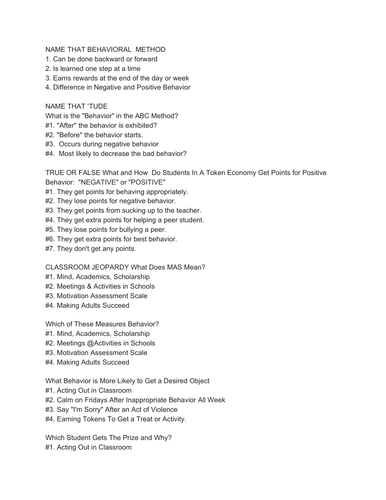



Differentiation in public schools can be difficult for teachers. However, teachers that learn how differences in the classroom require differences in how each group learn, teaching in a diverse classroom is easier. Each group has a method of learning. For students with developmental disabilities, the IEP is the tool used to support learning. Along with that behavioral concerns should be addressed.
Addressing behavioral problems is usually the job of support staff - behavior specialists, psychologists, therapists, etc. However, the behavior specialist is the one that will probably most involved with helping teachers and children deal with maladaptive behavior exhibited by students with developmental disabilities.
In order to help teachers and support staff in a very large, well-known city an in-service with a doctor who has worked miracles with his patients with developmental disabilities. He works mostly with students with autism spectrum disorder but has worked his miracles on students with many types of maladaptive behavior.
However, not having worked in a school setting, he tasked this behavioral specialist/classroom teacher (of typical students, gifted students, and students with developmental disabilities in grades 2-12 over two decades, as well training staff in behavior analysis and retiring as a supervisor) to create a presentation for an in-service.
The results of that request are here in the form of an outline covering behavioral tools, examples of how those tools work, an understanding of the basic behavior problems and how parents should be part of the process. Added to the “behavior outline” is a “break out” session for various school groups using various materials.
Teachers, teacher aides, support staff, and substitute teachers, along with teachers with specialists (art, music, gym, etc.) constitute the groups, each with different learning tasks. Slides are used throughout the in-service
ice that have a great deal of information. The slides can be used if requested and can be purchased as a book.
Another excellent tool is the MAS (Motivation Assessment Scale) that is almost one hundred percent accurate in determining what is causing a behavior and which behaviors need to be dressed. This author has used in as a behavior specialist and given each of the teachers and aides fill out with almost all coming up with the same score.
Also, last but not least are a few games to play at the end of the in-service that you and your peers might like to use to identify various behavior management tools. They include games titled “Faculty Feud” “Name That 'Tude” and “Behavior Jeopardy.” All of the information is useful and easily understood.
I am charging ten dollars for the complete program (the MAS is free) but will reduce it by half if your school would like to purchase the program for teachers and other faculty, to use for in-services, parent training. The discount is available for all U.S. schools, groups of teachers, etc.
Howe
Something went wrong, please try again later.
This resource hasn't been reviewed yet
To ensure quality for our reviews, only customers who have purchased this resource can review it
Report this resourceto let us know if it violates our terms and conditions.
Our customer service team will review your report and will be in touch.